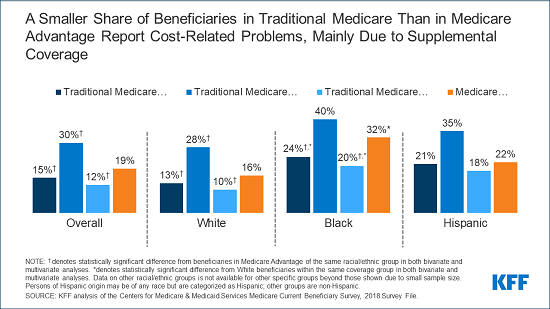
The independent source for health policy research, polling, and news.
Black Medicare Beneficiaries Are More Likely Than White Beneficiaries to Have Cost-Related Problems with Their Health Care, Across both Traditional Medicare and in Medicare Advantage Plans
Rates of Cost-Related Problems are Higher Among Beneficiaries in Medicare Advantage Than in Traditional Medicare with Supplemental Coverage, But Highest Among Beneficiaries in Traditional Medicare without Supplemental Coverage
Among people with Medicare, Black beneficiaries are more likely to have cost-related problems with their health care than White beneficiaries, finds a new KFF analysis, with the racial disparity persisting among beneficiaries in both traditional Medicare and Medicare Advantage plans.
While 17 percent of all Medicare beneficiaries, or about 1 in 6, reported health care cost-related problems in 2018, the rate among Black beneficiaries was double that among White beneficiaries (28% vs. 14%), according to the analysis of data from the 2018 Medicare Current Beneficiary Survey (MCBS).
Among Medicare Advantage enrollees, the rate of cost-related problems among Black beneficiaries was also higher than among White beneficiaries (32% vs. 16%), the analysis finds.
Among Black beneficiaries specifically, a larger share of those in Medicare Advantage reported cost-related problems than those in traditional Medicare (32% vs. 24%). The rate of cost-related problems was lower still among the subset of Black beneficiaries in traditional Medicare who had Medicaid or other sources of supplemental insurance (20%).
Cost-related problems were defined in the analysis as trouble getting care due to cost, a delay in care due to cost, or problems paying medical bills.
Across all Medicare beneficiaries, a somewhat smaller share of those in traditional Medicare than in Medicare Advantage reported cost-related problems (15% vs. 19%), with a lower rate among beneficiaries in traditional Medicare with supplemental coverage (12%). The analysis also shows that, overall and across racial and ethnic groups, the Medicare beneficiaries who are most likely to experience cost-related problems are those in traditional Medicare without supplemental coverage – 30 percent of whom reported cost-related problems in 2018.
Rates of cost-related problems were even higher among Black beneficiaries in fair or poor self-reported health, where half (50%) of those in Medicare Advantage experienced cost-related problems and one-third (34%) of those in traditional Medicare.
The analysis finds that enrollees in Medicare Advantage, who now account for more than 4 in 10 beneficiaries overall, do not generally receive greater protection against cost-related problems than beneficiaries in traditional Medicare with supplemental coverage, despite requirements for Medicare Advantage plans to have out-of-pocket limits. Differences in cost-related problems between Medicare Advantage and traditional Medicare with supplemental coverage are not fully explained by differences in the characteristics of beneficiaries, such as income and health status.
The new findings are noteworthy in that half of all Black beneficiaries are enrolled in Medicare Advantage (compared to just over one third of White beneficiaries).
However, the analysis does not estimate actual differences in average out-of-pocket spending among these groups, because it is not possible to derive comparable and accurate estimates of spending for Medicare Advantage enrollees using the Medicare Current Beneficiary Survey, as can be done for traditional Medicare beneficiaries.
For more data and analyses about Medicare and racial equity and health policy, visit kff.org
